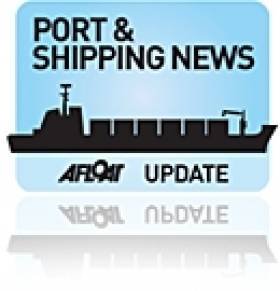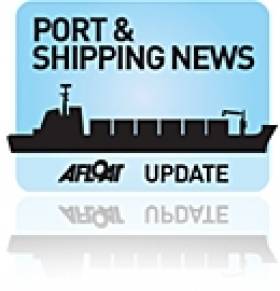Displaying items by tag: HMS Cumberland
All three visiting vessels were to be made open to the public over the weekend while berthed alongside the Deep Water (Coal) Quay downriver of the East-Link Toll-Lift road bridge.
FGS Brandenburg is the leadship of the Type-123 'Brandenburg' class. For a photo of the 4,900 tonnes frigate arriving in the Grand Harbour in Valleta, the capital of Malta (in 2004) click here.
The 20,240 displacement tonnes FGS Berlin is also the leadship of her namesake class of auxiliary fuel replenishment/stores-ship. The 174-metre long Berlin class ship (see photo) also has the capability to convey containers. The last of the trio, FGS Rheinland-Pfalz (photo) is a Bremen class frigate of 3,680 tonnes.
Since the Libyan crisis started in late February, the Maltese capital has been frequently used as a strategic transitional hub-port for naval vessels, including several calls by the UK's Type 22 frigate HMS Cumberland (F85). Earlier this month the Type 42 destroyer HMS York (D98) was also conducted to assist fleeing UK and foreign nationals from Benghazi.
In addition to other navies, Valletta has been used by ferries chartered by governments to assist in the evacuation of thousands of fleeing foreigners, mostly from Europe, though many other emigrants from Africa and Asia remain stranded.
HMS Cumberland Returns to Libya On Evacuation Mission
The Royal Naval frigate HMS Cumberland (F85) departed Malta today, to conduct a second evacuation mission of stranded nationals in Libya. In the early hours of this morning, HMS Cumberland had arrived into the Grand Harbour, Valetta, Malta with 207 stranded people, after departing the port of Benghazi on Thursday, writes Jehan Ashmore.
According to the Commanding Officer, Captain Steve Dainton, said: "The ship's company have responded magnificently. Ten days ago we were off the coast of Somalia conducting counter-piracy operations. I think it gives an indication of the flexibility and the versatility of a British warship and indeed of the ship's company onboard."
Following the first evacuation, HMS York was expected to arrive in the vicinity of the Libyan coast, should further assistance be required by HMS Cumberland. To read on the latest developments click here and this link too.
In addition the US authorities had chartered a fast-ferry catamaran to bring back stranded US nationals and other nationalities from Tripoli, the capital of Libya. The fast-craft vessel arrived in Valetta last night.
As the crisis was unfolding in Libya, HMS Cumberland was returning to the UK via the Suez Canal after completing a four-month operation in the Gulf, where her duties included helping to protect Iraqi oil platforms. The installations account for nearly 90% of Iraq's national income.
A sistership of HMS Cumberland, the 1986 built frigate, HMS Chatham (F87) was the last Royal Naval visitor to call at Dublin in late November
(click here and for photo).
At the time of HMS Chatham's visit to the capital, the 1988 built frigate had recently returned to UK waters, after also been engaged on anti-piracy duties, while off Somalia.
When HMS Cumberland has completed duties off Libya, the frigate, as originally planned is due to resume her voyage home to UK waters. The British Ministry of Defence are to decommission the 23-year old vessel.
Both frigates are 'Broadsword' Type 22 Frigates (Batch 3) along with HMS Campeltown (F99) HMS Cornwall (F86). All four frigates were launched during the mid 1980's and have a crew of 250-sailors.

























































